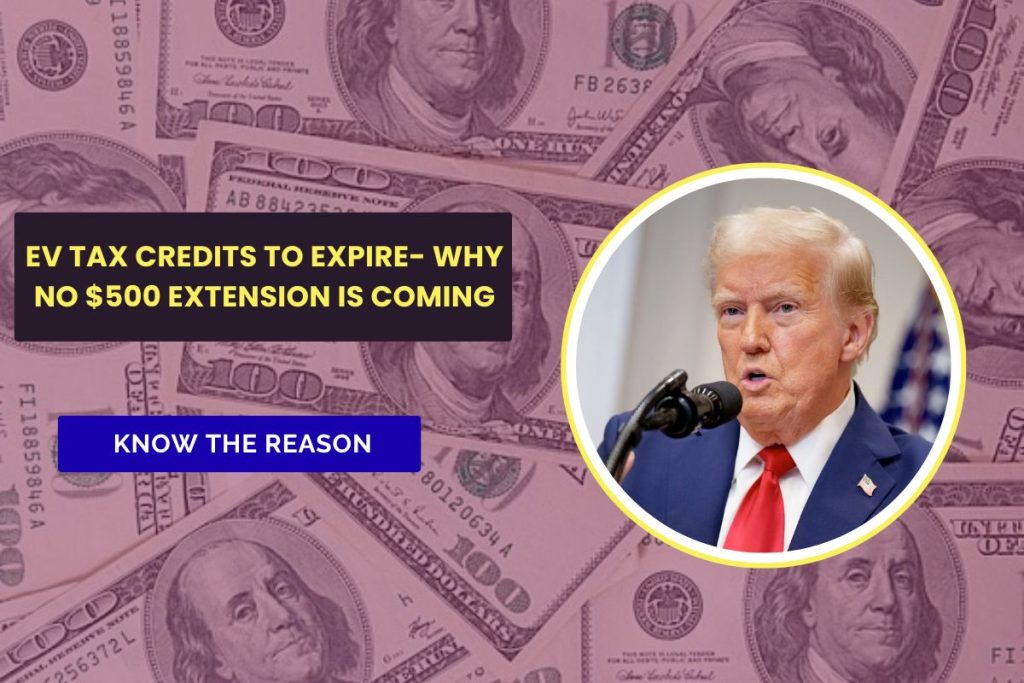Electric mobility has penetrated the market at a pace never expected, and prominent reasons for that might be attributed to the low cost of maintenance and eco-friendly tag, which has pushed people towards it. Governments across the globe have been offering subsidies and tax rebates on EV purchases. Similarly, the United States government provided tax credits for EVs, which decreased the cost for consumers and pushed the narrative of low emissions.
Since the Trump administration has come to power, its agenda of cutting expenditure involves subsidies and rebates, including EV, which has recently created a feud between him and his major ally, Elon Musk, who is the promoter of Tesla. If you’ve heard the chatter about a new $500 electric vehicle tax credit for 2025, you’re not alone. The internet is full of headlines suggesting that buyers will get a smaller bonus from the government for going electric. But here’s the truth: that $500 credit doesn’t exist, and if you’re still counting on federal help to bring down the price of your next EV, you’ve only got a few months left.
There are several slanders lingering around about the government’s policy on e-mobility. Let’s delve deeper into the piece to get the insight regarding EV tax credits, which you must know if considering making a purchase.
$500 Tax Credits on EV purchase : An Overview
| Nation | United States of America |
| Statute type | Federal |
| Subject | Highlighted EV tax credit extension for 2025 |
| Credit amount | $500 |
| Halting from | 30th September |
| Impacting | EV industry and customers |

Why No $500 EV Tax Credits ?
This summer, the federal government approved legislation that effectively kills the electric vehicle tax credit, once a central piece of the country’s green energy policy. It wasn’t quiet or accidental. It was all part of a much broader law, the “One Big Beautiful Bill,” signed into effect in July. Buried inside its hundreds of pages was the decision to roll back the generous EV credits many drivers have relied on for over a decade.
The numbers used to be simple, such as up to $7,500 off a new EV, or up to $4,000 off a used one. The credits applied if the car met certain standards and if the buyer’s income didn’t exceed the limits. They helped tip the scales for buyers who were hesitant to pay more upfront for a car that wouldn’t need gas. And they worked sort of. EV sales soared over the last few years. Charging stations popped up in places you’d never expect. Even major automakers started shifting their production lines toward electric vehicles.
$500 EV Tax Credits Timeline
But just as quickly as they came into fashion, the tax breaks are being pulled away. The cut-off threshold is decided to be September 30, 2025. After that date, no more federal credit, no matter what you buy or how green your intentions might be.
So, what happened to the $500 credit that’s being talked about online? The short answer to the concern is that it turns out to be a myth. Some websites started floating the idea that, even as the big credits expired, Congress might leave a smaller one behind, sort of a consolation prize for buyers who missed the boat. But nothing of the sort made it into law. There’s no active federal program offering a $500 EV credit in 2025. If someone tells you otherwise, they’re probably misreading state programs or old drafts of the legislation.
The Reason behind the Rollback of EV tax credit policy
The real picture appears to be that the current administration, backed by a Republican-led Congress, decided the market no longer needed government help to sell electric cars. Their argument?
EVs have gone mainstream, and taxpayers shouldn’t be footing the bill for buyers, especially when many of those buyers are well-off enough to afford pricey new vehicles without help. There’s some logic to that, depending on where you stand politically. But there’s also a downside. Without those credits, a lot of middle-income buyers may walk away from the EV lot altogether. While prices are dropping, the average electric car is still significantly more expensive than its gas-powered cousin. And with interest rates where they are, every dollar matters.
Dealers Are Pushing Hard Over EV tax credits
That’s already starting to show. Dealers across the country are seeing a late-year rush of buyers trying to get their EVs in before the deadline. Some brands are even sweetening the deal, offering discounts that stack on top of the federal credit or promising to match part of it out of pocket. But all of this is temporary. Once the credits disappear, many expect a steep slowdown in EV sales, at least for a while.
And don’t expect the states to save the day. Sure, a handful of them, California, Colorado, and New York among them, offer their own incentives. But these are smaller, come with tighter rules, and often require buyers to jump through more hoops. In most parts of the country, federal support was the big one. And soon, it’ll be gone.
What to do for EV Tax Credits
So, if you’re on the fence about buying an electric car this year, the message is clear: decide quickly. If you wait until the fall, you’ll be paying full price, and there’s no guarantee those deals will stick around. Automakers are bracing for what comes next, and it’s likely to involve belt-tightening and slower sales.
There’s still time, but not much. The credit is still active through the end of September, provided your vehicle meets the criteria and your income qualifies. And if you’re not sure what qualifies, talk to a dealer; they’re more than happy to help buyers navigate the rules, especially now.
No one knows exactly what will happen next. Maybe the government brings back a version of the credit down the road, or maybe the EV market learns to stand on its own. But for now, what’s certain is this: the window is closing fast. And no, there’s no $500 fallback waiting on the other side.
FAQs
Will there be $500 federal EV tax credit policy in 2025?
No, as of now, there is no assurance made by any federal legislation regarding the EV tax credit policy, which used to offer $500.
Till when will the current policy be in force?
The EV Tax Credit Policy, which offered $500, will cease to exist after 30th September 2025, so if you are planning to buy a new EV, then it would be beneficial to make the purchase before that.
So, is there going to be a complete ban on the EV subsidies or rebates?
Yes, from the federal government side, but the state governments can make their own legislation to support that, provided that the funds will be coming out of the concerned state’s treasury for the scheme.

Hello! I’m Kaylani , a professional content writer with a knack for breathing life into words. I have been providing high-quality, research-driven content in Sectors like Technology & Personal Finance . With a background in Finance Tech Management , I specialize in turning complex information into engaging content that resonates with a wide.
